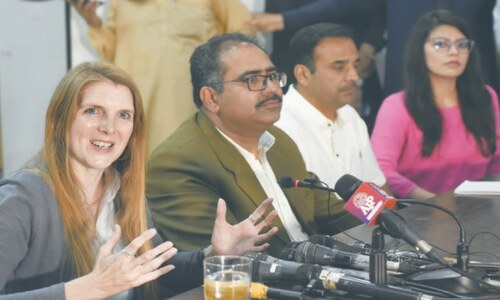ISLAMABAD: She was no Sufi but a follower of the man she loved so intensely that she switched from writing in English, learned Urdu, married him and became the celebrated novelist and playwright Bano Qudsia.
This and other hidden sides of Bano Qudsia, who died in Lahore on February 4, were recalled at a reference held in her memory by the National Language Promotion Department (NLPD) here on Monday.
Bano Qudsia was mourned also in the Senate which passed a unanimous resolution praising her contribution to Urdu literature.
Her literary contemporaries, who gathered to eulogise at the NLPD event, best remembered her as a deeply sensitive soul. One could agree or disagree with her portrayal of the society but she saw and truly felt.
For one, Prof Fateh Muhammad Malik, a former vice chancellor of the International Islamic University Islamabad, was shocked when he read her popular novel Raja Gidh (King Vulture), some 30 years ago.
“It painted a very ugly picture of the Pakistani society. She described both the rulers and the ruled as vultures. Indeed, I wrote a critical review of it,” he said.
“However, 30 years later I find that Bano had shown vividly what future is going to be. What we see today in the society is what she had pictured in the novel - the rulers battling Panama Papers revelations inside the Supreme Court and their supporters defending them outside the Supreme Court,” he said.
It was the company of writers Qudratullah Shahab, Mumtaz Mufti and Ashfaq Ahmed that gave her the insight and foresight that her works reflect, said Prof Malik.
It was Uxi Mufti, a former director general of Lok Virsa and son of Mumtaz Mufti, who made the disclosure for many that Bano used to write stories and poetry in English initially. But then she fell in love with Ashfaq Ahmed and joined him in MA Urdu classes.
“Bano Qudsia was not a Sufi, only a follower of Ashfaq Ahmed,” said Uxi Mufti, adding that she died in 2004 with the death of her sage husband. “Over the next 13 years, she reproduced 70 books of Ashfaq Ahmed and published two new books of her husband,” he said.“She wrote long sentences to express her deep thoughts. She was a thinking writer,” he said.
Writer Masood Mufti said that Bano used to look at life “in a totally different way. She lived in a spiritual environment but whenever asked if she liked it or not, she won’t reply.”
Head of NLPD Iftikhar Arif lamented criticism about Bano Qudsia on the social media.
“It is not right to criticise the ideology of any person,” he said.
“Bano, Ashfaq, Mumtaz Mufti and Qudratullah were a different breed of writers,” he said. “Criticising them is same like someone criticising poet John Milton, Dante Alighieri and others,” he said.
“Unfortunately those who speak for freedom of expression, want it for themselves alone. We should respect the views of Bano,” he said.
Prof Ehsan Akbar fondly recalled that the house of Bano Qudsia and Ashfaq Ahmed ‘Dastan Sarai’ used to be the nucleus for the literati of Lahore.
“Her love for Ashfaq was so intense that once, in an interview, she said that she can sacrifice her son for her husband,” he said.
Bano Qudsia was born on Nov 28, 1928 in Ferozepur, India. She migrated to Pakistan with the family after Partition. Her father was an agriculture expert and her only brother, Pervaiz Chattha, a painter.
Her literary bent was noticed early. She started penning stories when in primary school. She graduated from the Kinnaird College in Lahore and completed her masters in Urdu from the Government College, Lahore, in 1951.
Though she earned much acclaim for her radio and TV plays, her novel Raja Gidh (The Vulture King) put her on a pinnacle. And her play Aadhi Baat is considered a classic.
Among her more prominent writings are Aatish-i-Zer-i-Paa, Aik Din, Amer Bail, Asay Pasay, Chahar Chaman, Chhotaa SheherBaray Log, Footpath ki Ghaas, Hasil Ghaat and Hawa Kay Naam.
She was awarded Sitara-i-Imtiaz in 2003 and Hilal-i-Imtiaz in 2010.
Published in Dawn, February 14th, 2017














































Dear visitor, the comments section is undergoing an overhaul and will return soon.